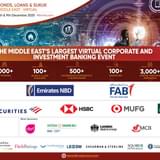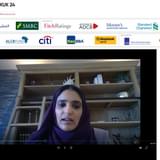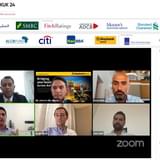What are some of the big strategic initiatives on the horizon at Etisalat?
We have operations in 18 countries, which have different market dynamics from geographical, cultural, economic and social development perspectives. Apart from our home market in the UAE, the largest subsidiary that we have is Maroc Telecom, which operates in 11 countries in West Africa – all French speaking. We also have different shareholdings in other large operating companies in Nigeria, Egypt, Saudi Arabia and Pakistan, as well as in other smaller operations in Asia and Africa.
Going forward, we want to focus on developing these larger operating companies. If there is an opportunity, and it is economically viable, we would also like to increase our stakes in some of these operating companies. This is because we know the operations well and believe that they are the countries that have comparatively bigger telecom markets, where in the long run, we’ll be able to create more value for our shareholders.
Consolidation is certainly a trend in the telecommunication sector, with some markets experiencing over-crowding, which affects profitability and hinders investment. For example, how can it be economically viable for a country the size of Tanzania to have more mobile operators than the United States, which is the world’s largest market? Therefore, we adopt a flexible approach to reflect prevailing market conditions, and take decisions only if they are in the interests of our shareholders.
We are not pushing forward too aggressively with any M&A plans, but given the current market conditions globally there may be some assets that come to the market. So if we see an opportunity we will evaluate it, but that opportunity would need to be fairly significant.
How is the economy influencing Etisalat’s funding strategy?
The global economic environment has implications for us, like everyone. Even though we have a very strong balance sheet, we have a very strong operational cash flow – thanks particularly to the stability of the United Arab Emirates – which means we have the capability to invest in our business and also make acquisitions. But I think given the current climate, we should be more conservative than in previous years because there are too many uncertainties around emerging markets.
China’s slowdown has impacted all of the commodity producers in the world, and if you look at emerging markets, particularly those we operate in, they are mainly commodity producers. The rate hikes in the US also have a significant impact, as many investors are being prompted to take their cash back into developed markets, which is increasing the cost of funding here, as well as lowering liquidity. We can use our position for our benefit here – we have about US$5bn cash, and a very strong operating cash flow, plus we are among the top three highest rated telecom companies in the world from the three big CRAs. So, we could tap the DCM market or the local and international banking market if needed. But one of the main things we need to consider when we inject cash in new business opportunities is whether we are going to create cash flows in hard currencies.
How is the evolution of the telecoms industry impacting the company’s strategy?
Data revenue is becoming increasingly important and is a growing segment, though in some of the markets we operate in this may not be the case – Nigeria for instance, where voice revenues are still growing double digits. But in Europe for example, voice revenues are going down. It all depends on the development phase of the country. We will continue to invest in networks because the data volumes we need to carry are increasing significantly. In some of the markets we operate in, we are the market leader – like Morocco and the UAE – but we still need to improve and invest in new technologies. ICT is also very important for us, but again it largely depends on the development phase of the corporates and enterprises, and the availability of telecom infrastructure.
Vendors and operators that you rely on – how are they fairing in this environment?
There are no more than 4 or 5 well-known big vendors. These are professional companies using all kinds of financial tools to hedge their liabilities. And that in turn is an advantage for us. They can plan their cash flows well in order to supply equipment all over the world. Challenges like capital controls and access to USD do arise in some of the countries in the Middle East where we operate. So even though our operations have cash, they cannot access US dollars, but still have to pay vendors in US dollars. It’s not something specific to our company; if you want to do business in some countries, that’s the reality of doing business there, and all of the telecom companies are likely facing the same issues.
Forex is a big issue this year in Emerging Markets – how do you mitigate some of these challenges in the countries that you operate in?
We operate in 18 countries where we have different regulations and different dynamics. Our strategy relies on keeping only enough cash for our operational cash needs at the operating company, and repatriating all of the surplus cash back to the UAE, so when we look at our total cash, 85- 90% is here in the UAE. We leave 10- 15% in the countries for operational working capital management, so we don’t experience significant levels of FX exposure like other companies operating in multiple geographies and currencies. It is possible to find higher interest returns in some of these countries, but we are not going after this as an explicit strategy – for instance, I can get higher interest in Egypt, but I would rather lose out on a few percentage points if it will mitigate our FX exposure.
When our operating companies need funding, we always look to the DCM market, but if we can access the local banking community in the countries we operate in, we tend to do so, and in the respective local currency.
Have the region’s market conditions had an impact on the banks with which you chose to work with – and the banks approaching Etisalat?
We have many relationships with banks, both local and international. When we financed the Maroc Telecom acquisition for instance, we had about 17 banks working with us. Those 17 banks were based in the US, Europe, GCC, Japan and Singapore – in short, pretty much everywhere. We want to keep our options fairly wide. This strategy has served us well – we are a large company and we don’t want to just depend on a few banks. We want to keep good relationships with local banks, but we don’t want to depend on them entirely.
That said, we are now starting to work with more Chinese banks as well, in part because we are planning on doing some transactions with them. We have great relationships with local banks, but we are always meeting with new banks.
Last year was the first time Etisalat issued a bond internationally, and it was a huge, well-regarded deal in the region. How have recent market conditions changed the company’s approach to the international debt capital markets?
The issuance last year saw oversubscription of around four times, and a weighted average tenor of 9.3 years. We used the facility to make an acquisition; we don’t typically hit the capital markets for short-term financing. There is significant volatility in the markets at the moment – for example, spreads on our own bonds have tripled since we issued, despite having the same credit rating and operational cash flows. So we could go to the DCM market, but the conditions aren’t in our favour now. Knowing we could borrow at a lower cost in the future, why go now? This is particularly why our banking relationships are so important to us. We need to tap into these relationships when we have funding needs while DCM markets are not favourable. At the end of the day, we could create a club deal with big banks and borrow at a much lower cost, if and when needed.
What do you see as the biggest thing on the minds of most of the region’s telecoms CFOs this year?
In general, revenue growth rates will decline. There are some sectors that are exceptional, but for many in the telecoms markets that is broadly the case. We will continue to grow, but at a slower pace, which is increasing the emphasis on driving cost efficiencies in our company. Optimisation is important, but when you’re delivering high rates of growth it takes less prominence; now, with revenue growth under pressure, cost and profitability will be in the spotlight. Cost efficiencies will be the biggest focus because it’s the most significant way to impact net profit.
If you are operating in emerging markets, FX exposure in EM currencies will be a huge concern. In 2016, the Fed will continue to increase interest rates, the Chinese economy will continue to slow down, there will be further pressure on commodity prices, and that will put even more pressure on emerging markets and their currencies. If you are operating in countries where the currency is not pegged to the US dollar, you have to be very careful; for instance, we could grow in Nigeria by 20% and still may have to report annual declines.
Third, declining liquidity. Managing liquidity positions is critically important for all CFOs, especially in this region.









